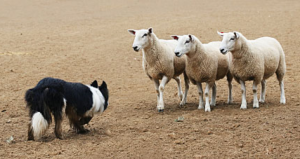Course Description
“Man’s” best friend? Nature’s most successful parasite? Exploring a range of perspectives–literary, philosophical, archeological, biological and technological–this course examines how the dog has been constructed i n human history, and how, in our determinations of the dog’s value as, e.g., hunter, protector, pet and/or medical specimen, we circumscribe our own identity as “human.” Over the course of the semester, we will explore the science of dog behavior, the psychology of animal ownership, the philosophy of animal agency, and the politics of animal rights. We will consider, as well, ethical problems posed by the technology of breeding, keeping animals as pets, and the use of animal models in scientific research. Through consideration of these issues, we will seek to reevaluate our understanding of the complex bond between humans and dogs and our moral obligations to other animals.
n human history, and how, in our determinations of the dog’s value as, e.g., hunter, protector, pet and/or medical specimen, we circumscribe our own identity as “human.” Over the course of the semester, we will explore the science of dog behavior, the psychology of animal ownership, the philosophy of animal agency, and the politics of animal rights. We will consider, as well, ethical problems posed by the technology of breeding, keeping animals as pets, and the use of animal models in scientific research. Through consideration of these issues, we will seek to reevaluate our understanding of the complex bond between humans and dogs and our moral obligations to other animals.
Learning Outcomes
All FYS courses have the following outcomes:
- Demonstrate critical thinking strategies related to interpretation and evaluation of texts (verbal, visual, or performative) in the context of course materials.
- Identify and consider your assumptions, thereby building informed perspectives.
- Identify and use information relevant to a specific purpose or goal.
- Employ effective search strategies to locate useful information.

- Access and use information ethically and legally.
- Analyze a variety of rhetorical situations.
- Identify and employ a range of strategies for discovering, developing, organizing, revising and editing.
- Identify and apply the discourse conventions of a chosen academic discipline or field (including conventions of genre, format, citation, structure, and vocabulary).
The outcomes below are specific to our course topic:
- Identify and analyze the intellectual processes involved in answering from several disciplinary perspectives the question, “What is the domestic dog?”
- Identify and analyze the ethical considerations involved in examining the above question.

- Acquire an introductory understanding of dog evolution, biology and genetics.
- Identify and analyze different narratives of the domestic dog’s evolution and the dog’s role in human history.
- Acquire an introductory understanding of human/animal constructions, including common representations of human/animal interactions.